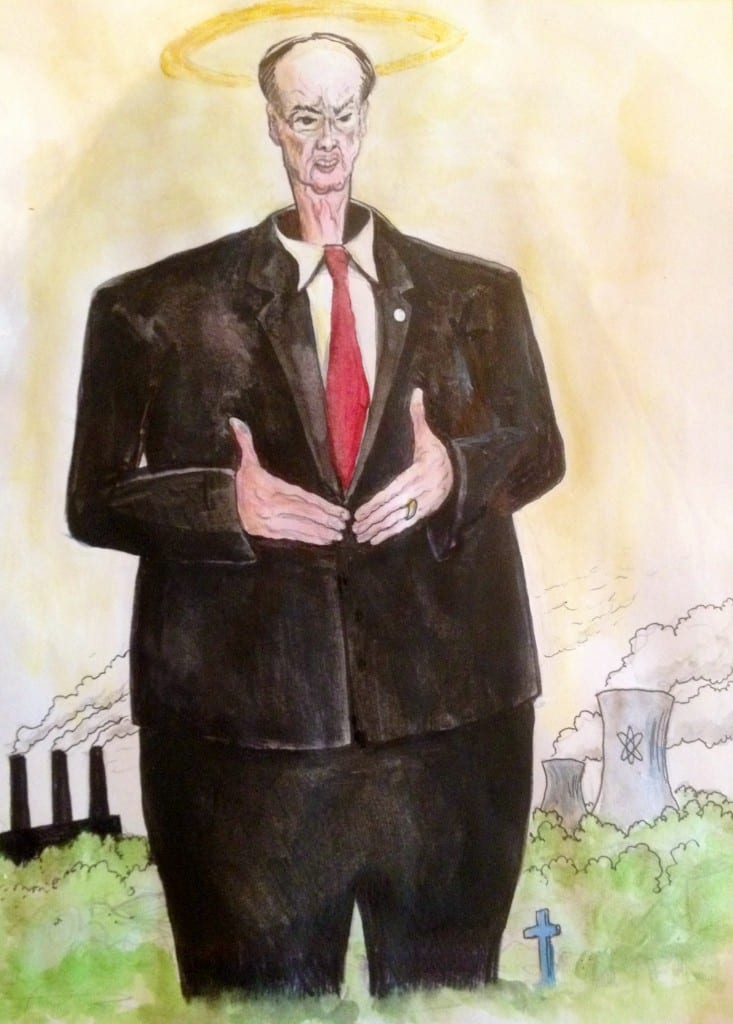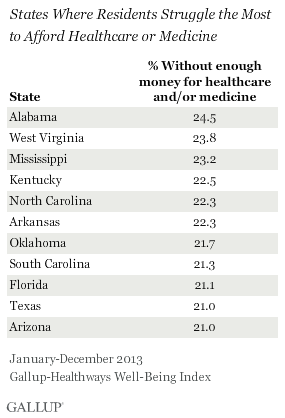Alabama Citizens Rank Last in Ability to Afford Healthcare and Medicine –
By Glynn Wilson –
The poor people of Alabama can no longer afford to sit back and thank god for Mississippi. They might thank a doctor governor for not taking a pay check, but that’s about it. He has abandoned the people in an election year and refused to help them obtain health care coverage, something they desperately need.
According to the latest Gallup poll on the subject, about 25 percent of the population of Alabama say they cannot afford healthcare, private insurance coverage or the medicine members of their families need to survive. That’s the highest percentage in the country, sending Alabama to the top of another list of the worst off states in the U.S.
While Gallup found that the residents of West Virginia and Mississippi followed closely behind, Mississippi has seen the greatest improvement since 2008 in the percentage of residents who say they can afford to pay for healthcare and medicine. The percentage who struggled in Mississippi steadily declined from 30.1 percent in 2008 to 23.2 percent in 2013.
States with the highest percentages of residents who could not afford needed healthcare and medicine are predominantly in the American South, where overall well-being scores lag compared with the rest of the country.
On the better end, Iowa and Minnesota tied for the lowest percentage of residents who were unable to afford needed healthcare or medicine at 12 percent.
Gallup asks Americans each day if there have been times over the past 12 months in which they did not have enough money to pay for healthcare and/or medicine they or their families needed. In 2013, 18 percent of Americans said they had trouble affording healthcare or medicine. The national average has held steady in recent years, after a slight drop from the 20 percent average in 2008 — a year when 24 states reported 20 percent or more of their residents could not afford needed healthcare. By 2013, after the Affordable Care Act went into effect and people started signing up, this dropped to 16 states.
States with higher percentages of residents who struggled to afford healthcare or medicine also tend to report higher uninsured rates and lower standards of living. All 10 states with the highest percentage of residents who struggled to afford healthcare or medicine had uninsured rates that exceeded the national average of 17 percent in 2013, and most were among the list of states with the highest uninsured rates.
Alabama and West Virginia also report low standard of living rates, which according to Gallup, may suggest that residents’ financial struggles may play a role in their ability to pay for healthcare. Alabama and West Virginia also rank among the poorest states in the nation based on per capita income.
Bottom Line
“States with higher uninsured rates are clearly more at risk of having higher percentages of residents who cannot meet their healthcare needs,” Gallup concludes. “States are making decisions on how to navigate the Affordable Care Act’s ongoing implementation. If states successfully reduce the number of residents without insurance, it may in turn help reduce the percentage who say they cannot afford what they need in terms of healthcare.”
But of course in those states where Republican governors are refusing to expand Medicaid and participate in what is widely known as Obamacare, like Alabama, many thousands of people will not be able to afford healthcare, private insurance coverage, or medicine. There are people dying needlessly every day in those states because of a distorted and false ongoing national debate about the role of government in the economy, an argument that should have been settled many years ago. It has not been settled because certain politicians know they can make political points by exploiting the issue to raise campaign money from corporations and win support at election time with conservative voters.
Survey Methods
Results are based on telephone interviews conducted as part of the Gallup-Healthways Well-Being Index survey Jan. 2-Dec. 29, 2013, with a random sample of 178,067 adults, aged 18 and older, living in all 50 U.S. states and the District of Columbia. The margin of sampling error for most states is plus or minus 1 to 2 percentage points, but is as high as plus or minus 4 points for states with smaller population sizes such as Wyoming, North Dakota, South Dakota, Delaware and Hawaii.

















I didn’t vote for the dude. Who did? Better try again. folks.